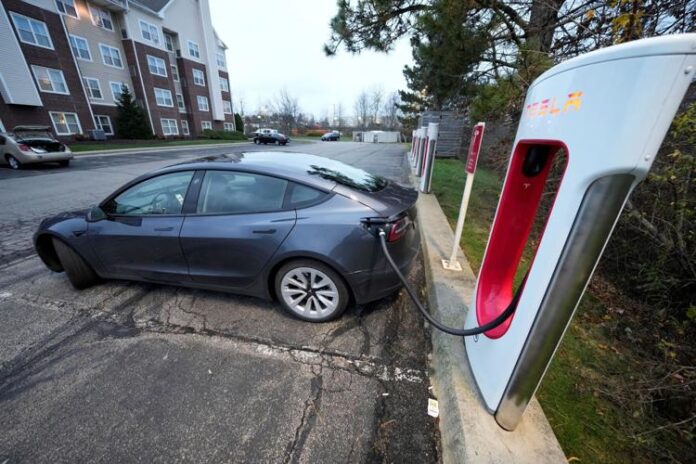
As President Joe Biden’s administration wants 50% of all new vehicle sales to be electric by 2030, some states are pushing bills to subsidize the industry.
In an analysis of state legislatures by The Center Square staff, actions so far this year in multiple states offer recognition to the emergence of the industry – whether trying to make up tax revenue shortfalls or simply boosting the move away from gas and diesel automobiles.
There is a bill pending and expected to become law in Illinois that would join others passed in Tennessee and Texas. Virginia’s attempt to break away from alignment with California standards failed, as did bills geared toward boosting the electric vehicle industry in Arizona and North Carolina.
Though Washington D.C. continues to move toward pushing electric vehicles, there’s no new legislation this session.
Nationwide, some states remain in session; others are done.
Both chambers of the Illinois Legislature passed the Electric Vehicle Charging Act, which if signed into law by Gov. J.B. Pritzker would require that a new single-family residence or a small multifamily residence shall have at least one electric vehicle capable parking space for each residential unit. Pritzker is expected to sign the legislation.
In Tennessee, Senate Bill 273 would open the door for toll lanes operated by private companies to build new lanes on the state’s highways and install tolling on those lanes.
The bill, which went into effect April 17, will mean electric vehicle owners will be charged a $200 registration fee starting next year that will rise to $274 and then begin rising with the consumer price index up to 3% annually starting in 2027. Hybrid vehicles will begin at $100 and rise in cost starting in 2027.
Both legislative chambers in Texas passed, and Gov. Greg Abbott signed an electric vehicle tax into law that would require electric vehicle owners to pay $400 to register a new electric vehicle and $200 to renew registrations. The new fees are meant to offset gas tax revenue declines and help pay for road improvement costs across the state.
In Virginia, Republican lawmakers tried to repeal the state’s alignment with California’s vehicle emission standards but ultimately failed in the Senate. The Golden State is among the leaders in pushing green energy initiatives, such as electric vehicles.
California had no significant legislation. Last year, the California Air Resources Board implemented a regulation phasing out gas-powered cars by 2035.
Michigan lawmakers have before them more than $300 million in the governor’s budget for electric vehicles and chargers. The state, a bedrock of the automotive industry, is in a pivot toward electric vehicles through a multitude of subsidies.
Gov. Gretchen Whitmer’s climate plan is for 2 million electric vehicles to be on Michigan’s roads by 2030, up from 25,181 in 2023. A 2021 Council on Future Mobility and Electrification report says 2 million would require 10,000 Level 3 chargers and 90,000 Level 2 chargers.
Arizona lawmakers considered legislation that would have incentivized businesses to build EV charging stations, increasing the number of available opportunities to charge electric vehicles across the state. Facing opposition from state utilities, the bill failed to make it out of the Senate.
In North Carolina, Senate bipartisan legislation for funding the roads through the alternative methods factoring in electric vehicles has been parked in the Finance Committee and didn’t make it across by crossover. However, revenue legislation is exempt from the crossover deadline.
Gov. Roy Cooper wants 1.25 million electric vehicles registered by 2030.
North Carolina would need to add more than 170,000 electric vehicle registrations per year over the next seven years to meet the 1.25 million registration goal. Last year’s jump of 13,377 lifted the total to 38,374 on Dec. 31, according to North Carolina Department of Transportation data. There are roughly 8 million gasoline and diesel vehicles registered for the state’s roads.
Washington State continued down the electric vehicle road under the administration of Gov. Jay Inslee and a Democratically-controlled Legislature.
Even before the start of this year’s legislative session, Republicans put forward their “Power Washington” energy package that focused on, among other things, slashing high fuel prices for drivers and shoring up the state’s electric grid to maintain affordable and reliable power. It went nowhere.
Last month, state officials – keeping in mind Inslee’s declared plan to follow California’s lead and ban the sale of new gas-powered automobiles in the state by 2034 – touted progress in the transition to electric vehicles. It was reported that there are nearly 125,000 plug-in electric vehicles in the Evergreen State, with that number looking to increase in the future.
Republished with the permission of The Center Square.













